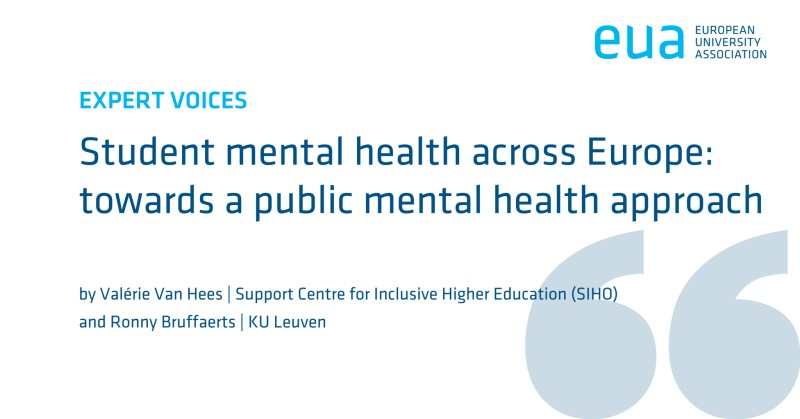Student mental health across Europe: towards a public mental health approach
The emotional health of students in Europe is receiving increased attention. During the PLAR-U-PAGs project we will organise peer-learning activities to deepen and sustain the exchange of good practices on mental health between EHEA countries at different stages of policy implementation. Based on identified needs, and working from a public mental health perspective, we will develop a comprehensive action framework including a self-assessment tool and guidelines to support sustainable mental health strategies at the national and institutional levels. In addition, a central web portal on financial assistance and psychological counselling services will be developed to enable a Europe-wide network of cooperation, staff training and information sharing.
Valérie Van Hees from Support Centre Inclusive Higher Education and Ronny Bruffaerts from KU Leuven share their perspectives on 'student mental health across Europe: toward a public mental health approach' for “Expert Voices”, an online platform of the European University Association featuring original commentary and analysis on the higher education and research sector in Europe.
Interesting resources
MoodSpace
MoodSpace is a place for students, which is packed with reliable information, tips and self-help tools to tackle emotional problems or to help you study confidently. It offers room for student stories and pep talks, and helps you find the help you need. It is the check to put your mental health first. But MoodSpace is also a place where you, as a friend, parent or staff member of a college or university, can discover what you can do.
THE WHO WORLD MENTAL HEALTH INTERNATIONAL COLLEGE STUDENT INITIATIVE
The WHO World Mental Health International College Student (WMH-ICS) Initiative is designed to:
- generate accurate epidemiological data on unmet needs for the treatment of mental, substance, and behavioural disorders among college students worldwide;
- implement and evaluate web-based interventions for both the prevention and treatment of these disorders; and
- disseminate the evidence-based interventions found to be effective using a continuous quality improvement approach designed to prevent degradation of these interventions in dissemination and successively improve targeting of interventions using precision medicine procedures.
